Podcast
Questions and Answers
Which planet has the highest average temperature?
Which planet has the highest average temperature?
- Mars
- Mercury
- Earth
- Venus (correct)
Mars has a longer orbital period than Earth.
Mars has a longer orbital period than Earth.
True (A)
What is the rotation time of Jupiter?
What is the rotation time of Jupiter?
9.9 hours
The diameter of Mercury is _____ kilometers.
The diameter of Mercury is _____ kilometers.
Match the following planets with their rotation times:
Match the following planets with their rotation times:
Which of the following is the deepest ocean trench?
Which of the following is the deepest ocean trench?
The period known as winter begins when days become longer.
The period known as winter begins when days become longer.
What represents the sun in the season diagram?
What represents the sun in the season diagram?
The observation of a galaxy cluster in the constellation _____ was noted in 2029.
The observation of a galaxy cluster in the constellation _____ was noted in 2029.
Match the following celestial phenomena with their characteristics:
Match the following celestial phenomena with their characteristics:
Flashcards
Mercury's temperature
Mercury's temperature
Mercury's average surface temperature is -175°C.
Venus's surface temperature
Venus's surface temperature
Venus has a scorching average surface temperature of 465°C.
Earth's rotation time
Earth's rotation time
Earth rotates on its axis every 24 hours.
Mars's orbital time
Mars's orbital time
Signup and view all the flashcards
Jupiter's orbital period
Jupiter's orbital period
Signup and view all the flashcards
Galaxy Cluster Observation
Galaxy Cluster Observation
Signup and view all the flashcards
Winter Solstice
Winter Solstice
Signup and view all the flashcards
Summer Solstice
Summer Solstice
Signup and view all the flashcards
Equinox
Equinox
Signup and view all the flashcards
Earth's Tilt
Earth's Tilt
Signup and view all the flashcards
Study Notes
Solar System Planets
- Mercury: Temperature: -175°C; Distance from Sun: 0.39 AU; Diameter: 4879 km; Rotation Time: 59 days; Orbit Time: 88 Earth years
- Venus: Temperature: 464°C; Distance from Sun: 0.72 AU; Diameter: 12,104 km; Rotation Time: 243 days; Orbit Time: 225 Earth days
- Earth: Temperature: 15°C; Distance from Sun: 1 AU; Diameter: 12,756 km; Rotation Time: 24 hours; Orbit Time: 365 Earth days
- Mars: Temperature: -63°C; Distance from Sun: 1.52 AU; Diameter: 6779 km; Rotation Time: 24.6 hours; Orbit Time: 687 Earth days
- Jupiter: Temperature: -100°C; Distance from Sun: 5.2 AU; Diameter: 139,822 km; Rotation Time: 9.9 hours; Orbit Time: 12 Earth years
- Saturn: Temperature: -140°C; Distance from Sun: 9.5 AU; Diameter: 116,464 km; Rotation Time: 10.7 hours; Orbit Time: 29 Earth years
- Uranus: Temperature: -195°C; Distance from Sun: 19.2 AU; Diameter: 50,724 km; Rotation Time: 17 hours; Orbit Time: 84 Earth years
- Neptune: Temperature: -214°C; Distance from Sun: 30.1 AU; Diameter: 49,244 km; Rotation Time: 16 hours; Orbit Time: 165 Earth years
Studying That Suits You
Use AI to generate personalized quizzes and flashcards to suit your learning preferences.



